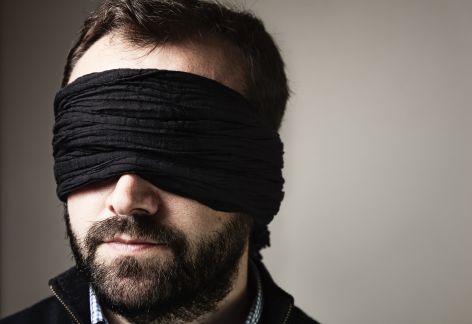Can You See Your Spiritual Blind Spots?
We all have blind spots in our character that we need to deal with and overcome. But how can we address and change what we can’t see?

Do you realize you have a blind spot in your eyes? Try this test.
Due to a lack of light receptors, there is a spot in our eyes where we cannot see. Everyone has this blind spot, but because our brain fills in the gaps, we usually aren’t aware of it.
But physical blind spots aren’t the most dangerous kind. We should be especially concerned about spiritual blind spots.
These blind spots are flaws and sins we can’t easily see, but which, if left unchecked, can become serious spiritual problems.
We have blind spots when seeing our own sins
In Matthew 7 Jesus illustrated a paradox in our nature: We can notice a speck in another person’s eye but cannot see a massive plank in our own. Jesus’ teaching effectively warns us not to judge others quickly, since we may be overlooking far more severe flaws in our own lives.
Instead, before we can truly help others, we must work hard to correct our own flaws (verses 1-5).
Our eyes work like a mirror. Light enters the eye through the cornea and is focused by the lens, generating a sharp and clear image on the retina at the rear of the eye. Our eyes serve as a great mirror for observing the outside world, but they only see outward. They aren’t designed for looking at ourselves.
“We judge ourselves by our intentions and others by their behavior,” remarked Stephen Covey, author of The 7 Habits of Highly Effective People. This quote highlights our prejudices, in that we frequently give ourselves a pass when we fall short, but often don’t extend that same mercy to others when they make mistakes.
Spiritually blind. Human beings often see others’ sins and flaws clearly, but are blind to their own. 
It’s easy for us to take offense when someone else engages in behavior that we find obnoxious. But when we do the same things, we don’t tend to be as bothered.
Paul warned against judging others for the very things we do ourselves (Romans 2:1, 21-23).
So the next time someone else’s rude behavior bothers you, use it as a chance to think about yourself. Turn your “eye-mirror” around and ask yourself, “Do I sometimes do that?”
Consider the example of King David. David slept with Uriah’s wife, Bathsheba. When David discovered she was pregnant, he orchestrated Uriah’s murder by sending him to the front lines of battle (2 Samuel 11:3-17).
After Uriah’s death, David believed he had hidden his sin. But God didn’t ignore it. He sent the prophet Nathan to David to deliver a parable about a rich man who had plenty but chose to steal the only lamb of a poor man. David was so angry that he proclaimed the rich man should be executed.
He could see the sin in someone else, but he couldn’t see “the plank”—the much bigger sin—in himself. But to his shock, Nathan told him, “You are the man!” (2 Samuel 11:3-17).
David had been blind to his own sin, but Nathan’s story was like a mirror that helped him see it.
In the New Testament, Jesus spoke a parable to the Pharisees because they focused on the sins of others while ignoring their own. In this parable, a Pharisee gave thanks that he wasn’t “like other men” and then listed only his own most righteous deeds: “I fast” and “I give tithes” (Luke 18:9-12).
In contrast, a tax collector saw his own sins and admitted them openly (verses 13-14). Jesus said God was more pleased with the humble, repentant tax collector than the self-righteous Pharisee.
Jesus called the Pharisees “blind guides” because they couldn’t see their own sins (Matthew 23:16, 24). They could see other people’s faults, but not their own, which were even more significant.
To learn more, read “God’s Priorities: The Weightier Matters of the Law.”
Christians must search themselves for sin
So how can we look for our sins when we are blind to our flaws? David realized he had blind spots and asked, “Who can understand his errors? Cleanse me from secret faults” (Psalm 19:12).
He referred to unnoticed transgressions as “secret faults.” They aren’t a secret to God because He knows everything about us, but they can be a secret to us. We do them, but we’re not always aware of them. Yet ignorance of our misdeeds is not an excuse for them.
Paul noted that our carnal mind is naturally hostile against God and His laws (Romans 8:7). But we humans tend to give excuses for our sins, such as:
- “This is just the way I am.”
-
“I’m only human.”
- “Oh, it’s no big deal.”
- “Everyone else is doing it.”
- “It’s okay as long as no one is getting hurt.”
- “It was just a little white lie.”
- “God will understand.”
- “At least I’m not as bad as [fill-in-the-blank].”
One reason we try to justify our flaws is to provide ourselves with an excuse not to change. Change is hard work, but change is also a vital part of true Christianity.
God the Father sent His Son to die for our sins. He didn’t die so we could continue as we are; He died so we could repent and turn away from our sins (2 Peter 3:9). Christianity is all about change. (To learn more, read “The Problem With ‘Just as I Am’ Christianity.”)
God says He “search[es] the heart” (Jeremiah 17:10). The Hebrew word for search means to penetrate, to examine intimately, to look deep inside. King David pleaded with God to examine his heart and see if there was a “wicked way” within him because God knows the heart (Psalm 139:23-24; compare Psalm 26:2). Christians should frequently ask God to make their flaws and sins more evident to them.
Especially before the annual Passover, Christians are urged to conduct a self-examination (1 Corinthians 11:28).
To learn more, read “‘Examine Yourselves’: What Does It Mean to Be Disqualified?”
War against sin
Once you identify and see your personal sins clearly, then what?
The answer is simple: Wage war on sin!
In its early chapters, the Bible highlights this war with sin. After God rejected Cain’s offering, God warned him that “sin lies at the door. And its desire is for you, but you should rule over it” (Genesis 4:7).
God’s law is a spiritual mirror. The Bible describes God’s law as a mirror—a mirror that helps us see ourselves as we really are. 
God wants us to have dominion over our sins instead of letting our sins have dominion over us (Romans 6:14-16). Either we will rule over sin or our sin will rule over us. We are either the master or the slave of sin (verse 16).
To learn more about how to put to death the “old man” (our old sinful ways), read “Putting to Death the Old Man: What Does That Mean?”
Seek God and look in the mirror
In his epistle, James compared God’s law to a mirror (James 1:23-25). We use the mirror of God’s law to truly see ourselves. Since God’s law represents His character, we look at it and ourselves to determine if we can see God’s character staring back at us. We become ignorant of our sins if we don’t look into God’s law.
Much of the mainstream Christian world believes the law is abolished or of little relative importance.
But that theology makes people even more blind to their sins. Doing away with the spiritual mirror of God’s law makes us more ignorant of our sins. If we don’t see our sins, we cannot truly repent and work on overcoming them! And thus, our sin remains.
We use God’s law to view our transgressions, just as we would use a physical mirror to view dirt on our faces (Romans 7:7). Once we see the dirt, we can then proceed to remove it.
The mirror has limitations, though. Just as a literal mirror is useless in cleaning the dirt off our faces, so the law cannot remove our sins. That’s not what a mirror—or the law—is designed to do!
The law merely displays our sins. Only the sacrifice of Jesus Christ can remove sin—and only if we truly repent and seek God’s forgiveness. But we can’t reach that point unless we truly see our sins first.
So, we should all look deep into the mirror of God’s laws and find our spiritual blind spots. The Bible tells us, “If we would judge ourselves, we would not be judged” (1 Corinthians 11:31).
To learn more about the purpose of God’s law, read “The Law: A Reflection of God’s Character.”
Date Posted: March 27, 2023



